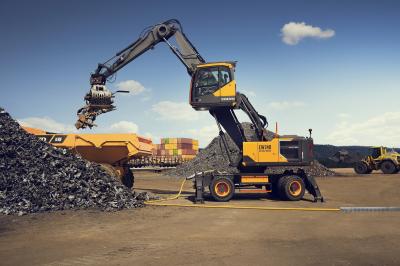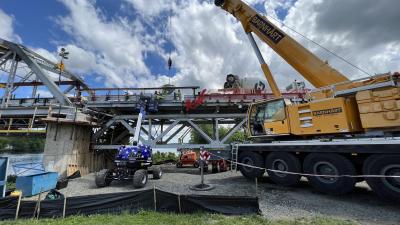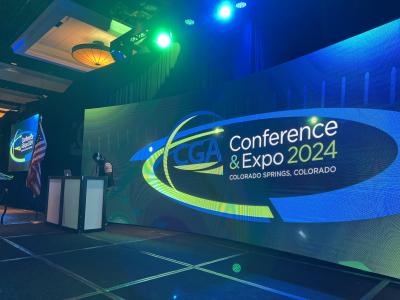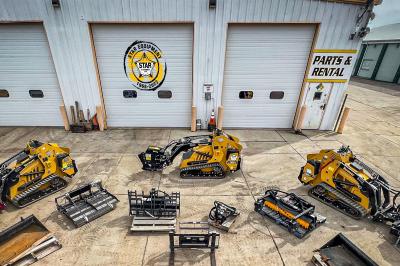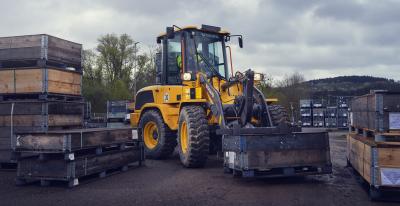The military calls it “building bridges in the sky.” Translated into civilian terms, it means mid-air refueling of fighter jets and B-52 bombers.
Flying tankers can carry up to 200,000 lbs. of jet fuel, and have the ability to fly at 30,000 ft. and at speeds of 530 mph. Pilots know there can be no mistakes and their missions must be performed precisely.
Although former tanker pilot and engineer Alan Gravel is no longer building “sky” bridges, he brings his learned precision and attention to detail to another kind of construction –– this time utilities –– as president of Willow Construction, Powder Springs, GA.
Gravel, who established his business in 1992, is a member of NUCA, and former president of the Georgia Utility Contractors Association. His market is divided evenly between water and sewer pump stations for public and private clients; reservoir construction and repair, and according to Gravel, “a hodgepodge of other stuff that nobody else wants to do.”
Because he’s known among his peers for having a well-organized company and the willingness to tackle tough projects, Gravel has been able to keep his business in the profit margin the last few years.
“Competition for projects is intense now because people are taking work for less than it should bring. But we’ve been able to keep our people working and continue to buy equipment because our volume has gone right up,” he said.
Steering a Steady Course
Gravel attributes his success to a business philosophy that revolves around quality performance and a sound financial plan.
“We emphasize quality, and not just quality in the work we do, but quality in the results we get,” he said.
Gravel’s business plan includes closely evaluating the pros and cons of purchasing or renting heavy machinery.
“What we try to do is buy the things we can keep busy close to 100 percent of the time because we know that’s the most economical thing for us,” he said. “We will rent to meet a unique need at a job site or in seasonal situations where we need to add to the fleet short-term. What we don’t want is to be running machines back and forth between jobs or having a project slow down because we’re waiting for a machine. If that causes us to rent, then we might as well buy because it makes more economic sense long term.”
Gravel has an internal equipment tracking system ensuring his equipment is getting the most bang for the buck. “We typically keep all our machines consistently busy,” he said.
“We know where every piece of equipment is and, when we move a piece of equipment from Job A to Job B, we enter that information into the computer. At the end of the month, we run a series of reports that allocates the costs based on how long each machine was on each job. We don’t keep up with run time and charge that back because that’s not really representative of the kind of work we do. We think that if the machine needs to be on a job on a certain day, then it ought to be charged to that job, whether it’s running or not. Because if it’s on that job, it can’t be working for us someplace else.”
Willow’s equipment fleet includes seven pieces of Komatsu equipment: four excavators including two PF55s, a PC200LC-6, and the newest addition, a recently purchased PC220LC-7; and three dozers including a D37 and two D41s.
“My equipment manager had been telling me for a period of time that we needed another machine like our PC200 because it was being run all over the place and constantly in demand. In addition, our PF55s have gotten to the point where we don’t really want to work them that hard. We want to keep them as second tier machines.”
Upgrading Machines Pays Off
Excavators are, in many ways, the brute force behind much of the work performed by Willow Construction. Whether the job involves pouring a 4-ft.-thick slab of concrete at the bottom of a river, or commonplace utility work along the side of the road, hydraulic excavators provide Gravel with the options he needs to perform jobs efficiently.
“Excavators are the most versatile machines around,” he added. “There are just so many things you can do with them, and when you do weird work like we do, it’s an indispensable tool.
“What I do believe about equipment is that you need to have the right piece to do the right job,” Gravel said. “We bought the PC220LC-7 specifically because of its lifting capabilities and substantially more horsepower. We can also share all our buckets and implements with our PC200 and PF55s. Our PC200 is a Dash-6 machine and it’s nearly seven years old. But it’s still a good machine, very reliable, and it’s out there every day making us money. The PC200 can do a good job of excavating and digging holes and loading trucks. But when it comes down to lifting big sections of precast concrete that weigh from 15,000 to 18,000 pounds, you’re not in the game with that machine unless you’re under the best conditions.”
The PC220LC-7 proved to be Willow’s workhorse on a sewage pumping station project, which included clearing, excavation, setting precast and pouring concrete, cleanup and backfilling.
“On this job, the PC220 performed practically the whole job,” Gravel said. “It cleared the trees off, it dug the hole, set the bottom piece of precast, swung pipe and backfilled. When we poured concrete, we dropped the bucket off and used it as a crane to handle a concrete bucket placing the concrete slab in the bottom of the hole.”
Production was additionally maximized by the excavator’s use of attachments with a quick coupler. Willow’s bucket inventory ranges from 21 to 48 in. (53.3 to 121.9 cm) buckets and a 60 in. (152.4 cm) ditch cleaning bucket. Other attachments include a compactor wheel, root rake, thumb device and rock ripper.
At the sewage pumping station site, the operator used a bucket to supply dirt to workers who were using a jumping-jack compactor to backfill between two precast structures. The operator also placed dirt in the surrounding area and then dropped the bucket and picked up the compactor wheel to compact where machine compaction was possible and efficient.
“The ability to switch back and forth quickly is the key to efficient use of attachments,” Gravel said. “If it takes an hour to switch back and forth, it’s not worth doing.”
In addition, there are maintenance benefits with the quick coupler, because the pins are not removed when switching attachments.
“If we didn’t have the quick coupler, we’d be knocking pins out to change the bucket every time. But the pins stay in and with automatic lube, the grease stays clean and the seals don’t tear.
“We’ve been in business for 11 years and we’ve never had to actually rebuild any bushings on any buckets or sticks because the wear occurs on the bucket pin, which is easily replaceable, or the wear occurs on the quick coupler. Most of them are adjustable, so you can adjust the wear out,” Gravel said.
Valued Relationships
Gravel prefers that Tractor & Equipment Co., his Komatsu distributor, handle all maintenance procedures for Willow.
“We probably see our distributor more than most because they do all our maintenance.”
Gravel has found that selecting a distributor is more than just selecting one that carries his preferred brand of equipment.
“Ultimately it comes down to choosing a certain brand or model. You can’t buy them all, so you have to try to find the machine that best suits your needs and find the people that you can depend on.
“We want to deal with people who will support us and who can offer solutions to our equipment problems, which ultimately helps us run our business more effectively,” Gravel said. “Tractor and Equipment Co., is our partner in terms of going out of their way to assist us.”
Gravel not only thinks of his equipment distributor as part of his team, he thinks of them as friends.
“Life’s too short to not enjoy what you’re doing and to not have fun at it –– I’m not saying it’s a great time every day, but at least I don’t dread going to work. A positive attitude and confidence in your suppliers and employees, makes the day a lot less stressful.”
Gravel has 40 employees, including eight separate construction crews. The company’s job sites are primarily north Georgia between Macon and Chattanooga, with an occasional out of state job.
“I have a strong company, the people are loyal, we have zero turnover –– and I mean zero turnover. You just don’t have that in a lot of construction companies,” Gravel said. “I’ve thought many times that people who work for Willow have a sense that what’s good for them is good for Willow, and what’s good for Willow is good for them. I can’t ask for anything more than that.”
Today's top stories





